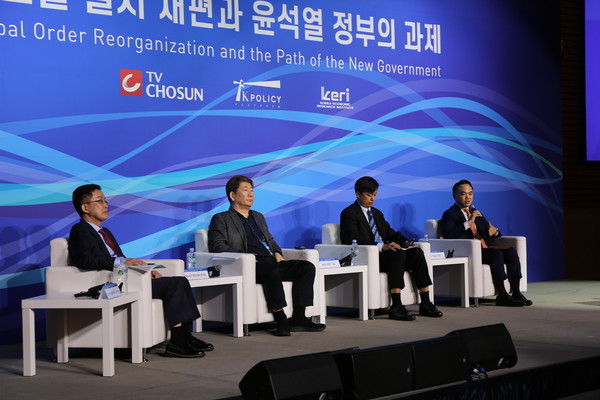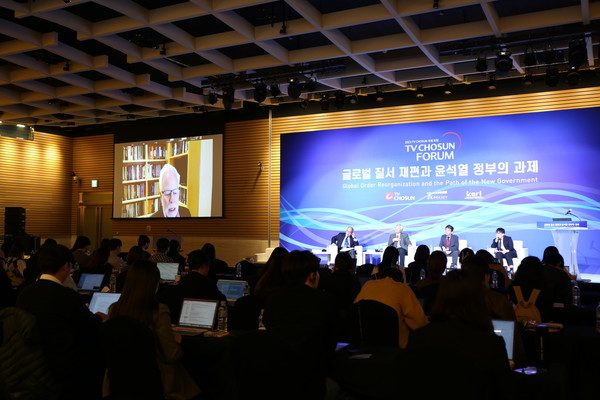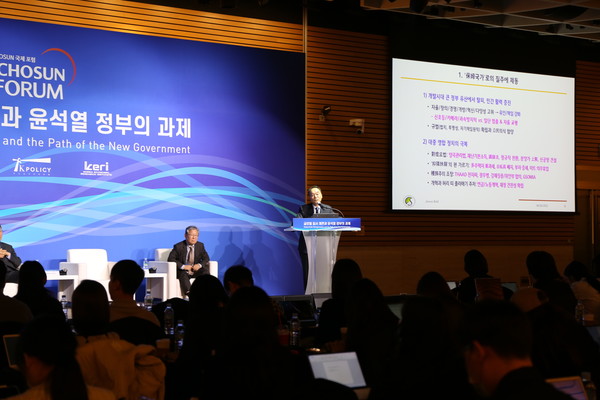TV Chosun tries to find “flexible and deep themes” and solutions to problems with many intellectuals all over the world for their annual forum. “Reorganization of the Global Order and the Path of the New Government” is the theme for this year, seeking the future of Korea in the changing global order. Let’s look into the forum sessions of “security, economy, and reform” that are most relevant to the current situations mentioned above.

Session 1: National Security (Chairman: Seong-Whun Cheon / Former President, Korea Institution for National Unification)
In session 1, professor Hal Brands presented and the panels looked at the geopolitical implications on the ROK-US alliance and South Korea-Japan relations. Moreover, the current government's policies on these issues were discussed. As the possibility of Chinese military activity in the Taiwan Strait increases, concerns have been raised that the security situation in Northeast Asia seems intimidating. In particular, it was emphasized throughout that security threats in Taiwan and the Korean Peninsula are a menace to international rule-based order. In this regard, panels emphasized the importance of a closer alliance between the U.S. and its allies, saying that integration is necessary to suppress disputes and conflicts.
Session 1 Interview: S. Paul Choi, Fellow of RAND Corp
Q. According to the research conducted by the RAND Corporation, if China invades Taiwan, they would experience a 25~25% reduction in GDP. Currently, the world is making contingency plans in preparation for a China invasion of Taiwan. CAH would like to hear research fellow Choi's opinion on the possibility of China invading Taiwan while enduring this level of GDP decline, and the benefits it could gain.
A. A China invasion of Taiwan in the near future is possible. Unification may be considered more important to Xi Jinping and his legacy than the estimated impact on the Chinese economy or people. Also, there are three trends that increase this possibility. First, from the China's point of view, the current situation of an increasing number of Taiwanese that oppose unification with China, as well as the increasing readiness of Taiwan to deny an invasion as the China and other countries further prepare to help their defense, may be viewed as a closing window of opportunity to realize this national vision and goal of Xi Jinping. Second, through its “dual circulation strategy,” the China's economy is undergoing a restructuring. Also, the effort of the U.S. and other countries to similarly decouple their economies from, and compete with China, reduces interdependence that will also reduce the vulnerability of the Chinese economy from external influence. Third, with Russia’s ongoing invasion of Ukraine, North Korea’s increasingly provocative behavior, and greater strategic Russia-China-North Korea alignment, Xi Jinping may consider the U.S. and its allies unprepared to respond to various contingencies at the same time. Ultimately, it is difficult to know with any confidence what Xi Jinping’s intent is, whether he is willing to have China incur the costs of an invasion of Taiwan, or even if he has the confidence to successfully do so. South Korea will have to focus on China's military capabilities and aspirations to prepare deterrence and defense mechanisms to safeguard its own security.
Q. To sum up the opinions of the experts from Session 1, "Northeast Asia is currently facing a growing number of security issues. It is important to strengthen the network among allies." However, the South Korean government is not discussing a plausible bill for the current situation. CAH would like to ask research fellow Choi’s opinion on which directions South Korea should head for our survival strategy in the future.
A. South Korea should accept a redundancy of strategic security. For example, if the U.S. decides to reduce assistance to South Korea due to the North Korean threats, South Korea needs to have the ability to respond independently. South Korea will be able to deal with a direct blow when the U.S.' aid is limited, having established redundant cooperation systems with other countries. The concept of a supply chain is similar. If a particular trade route is blocked, a plan must be devised to open another route. By considering resiliency rather than efficiency, South Korea can develop viability in a national security environment. Thus, the South Korean government should pursue 'redundancy stretagy' as a theme of national security strategy design. In order to complete that, effective communication between the government and the people is required. As an open and democratic country, South Korea must always be aware that the flames of external conflicts (including North Korea) can be flamed at any time. If strategic motivations are logically explained to the public when executing security strategies, risks such as external threats and conflicts between the ruling and opposition parties can be minimized.
Q. Prof. Hal Brands mentioned that friendly relations between Japan and Korea will have a positive effect. In addition to president Yoon’s recent remarks, how would the relationship at the upcoming 2023 G7 Hiroshima summit affect Korea’s national security affairs in the future?
A. Positive relations would certainly be helpful for Korea’s national security. However, how helpful and sustainable it will be depends on the domestic policies of each country. The Japanese government is concerned that Korea’s consolidate democracy, which is frequently subject to regime changes, could lead to the destruction of the agreement in the future. In other words, Japan can’t fully trust Korea and whether the next government will keep the promise or not. Therefore, the most important thing is the communication between the Korean people and both governments. If the Japanese government persuades the Korean people how strengthening South Korea-Japan relations will benefit them, the two countries will be better able to come up with long-term measures. In terms of Korea's security, if we strengthen cooperation with Japan, active information exchange between the two countries will contribute to the national interest in all areas including tech and space industries and even the financial markets.

Session 2: Economy (Chairman: Tae-Soo Kang / Professor, KAIST)
The second session discussed the directions the U.S. and South Korea will likely take, in the recent global financial market of higher volatility and frequent banking crises. Professor Barry Eichengreen of Berkeley University Department of Economics (presenter) expected that the current banking crisis in the US will not develop into a global systematic crisis. Therefore he insisted that the Federal Reserve Board (FED) should decisively raise interest rates to control the inflation. The session also deals with the dollar hegemony’s disintegration, represented by China using the yuan in oil transactions with the US amid the two country’s deepening conflicts. Afterwards, Cheol-Beom Park, Professor of Korea University (panel), asked ‘what the market's response to the crisis will look like when the U.S. reaches the debt ceiling.’ Prof. Eichengreen replied that the volatility index will increase as in 2011 for the hardline Republicans dominating the parliament are strongly demanding the government to cut on spendings.
Session 2 Interview: Cheol-Beom Park, Professor of Korea University Department of Economics
Q. If the U.S. sovereign credit falls and the dollar hegemony is threatened, it seems to negatively affect U.S. bonds owned by the Korean government. Is it necessary for the government to actively response to this crisis, or will the problem be resolved itself?
A. I think the recent fall in U.S. government bond prices is a result of the FED’s sharp increase in interest rates. Bond prices are determined by the present value of the amount promised to be paid in the future. Hence it is a natural result that bond prices fall when interest rates rise. I think there is a leap of logic to view the recent fall in U.S. government bond prices as a result of the US’s falling credit and the dollar hegemony crisis.
Q. The ‘debt ceiling’ is a unique system in the US that guarantees free spending by the administration. The U.S. has maintained this system for the past few decades but has experienced tremendous debt growth. Furthermore, in 2011 and 2013, even today, the debt ceiling threatens the US economy as a political weapon. Is the US’s debt ceiling system still worth maintaining despite all those side effects?
A. The Congress' cap on government debt is a legislative check to limit the administration's sharp increase in debt. Therefore, when differences and conflicts of the administrative and the legislative part are not resolved properly, the system can increase uncertainty in the U.S. economy. In other words, the debt ceiling is no big problem if the U.S. administration and legislature mediate the conflict well, but it can be an obstacle to the economy if there is sharp political polarization. It seems that economics and politics should keep on contemplating how to deal with conflicts and how much debt limit should be set.

Session 3: Innovation (Chairman: Sook-Yon Won/ Professor, Ewha Womans University)
After the presentation of William Tompson (Head of Eurasia Division, OECD Global Relations Secretariat), panelist Jae-Wan Bhak, Professor of Sungkyunkwan University, explained that the Lee Myung-bak government (gov.) tried to stimulate private initiative & mmarket-friendliness and establish a fair order in Korea. So, the gov. promoted the obligation of public announcements about labor and management negotiation and rules of employment and expanded the Performance-based Remuneration Scheme. However, the public turned their back on the gov. since that gov. was lacking continuity as the promised small gov., and broke some pledges, despite of the Presidential Council for Future & Vision. Thus, we should try to settle down autonomy and responsibility between the gov. and the public, not burden the rest of the country. We should especially work to reform old-fashioned organizational cultures. In addition, we must try to think about gov. as a whole, not be loyal to a particular party, and utilize referendums. To conclude, we have to recognize our differences, come together for true reform.
Baek Seung-mok, an official from TV Chosun, encourages everyone to participate in the forum that suggests wise solutions, by saying that “It will be very helpful if university students, the future of Korea, participate in the forum and have interest in it, since the forum can grow up with the audience.” CAH readers can receive a lot of help from this forum, since officials from the TV Chosun select speakers among knowledgeable scholars in their majors.

